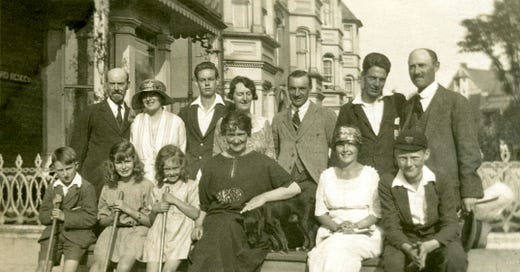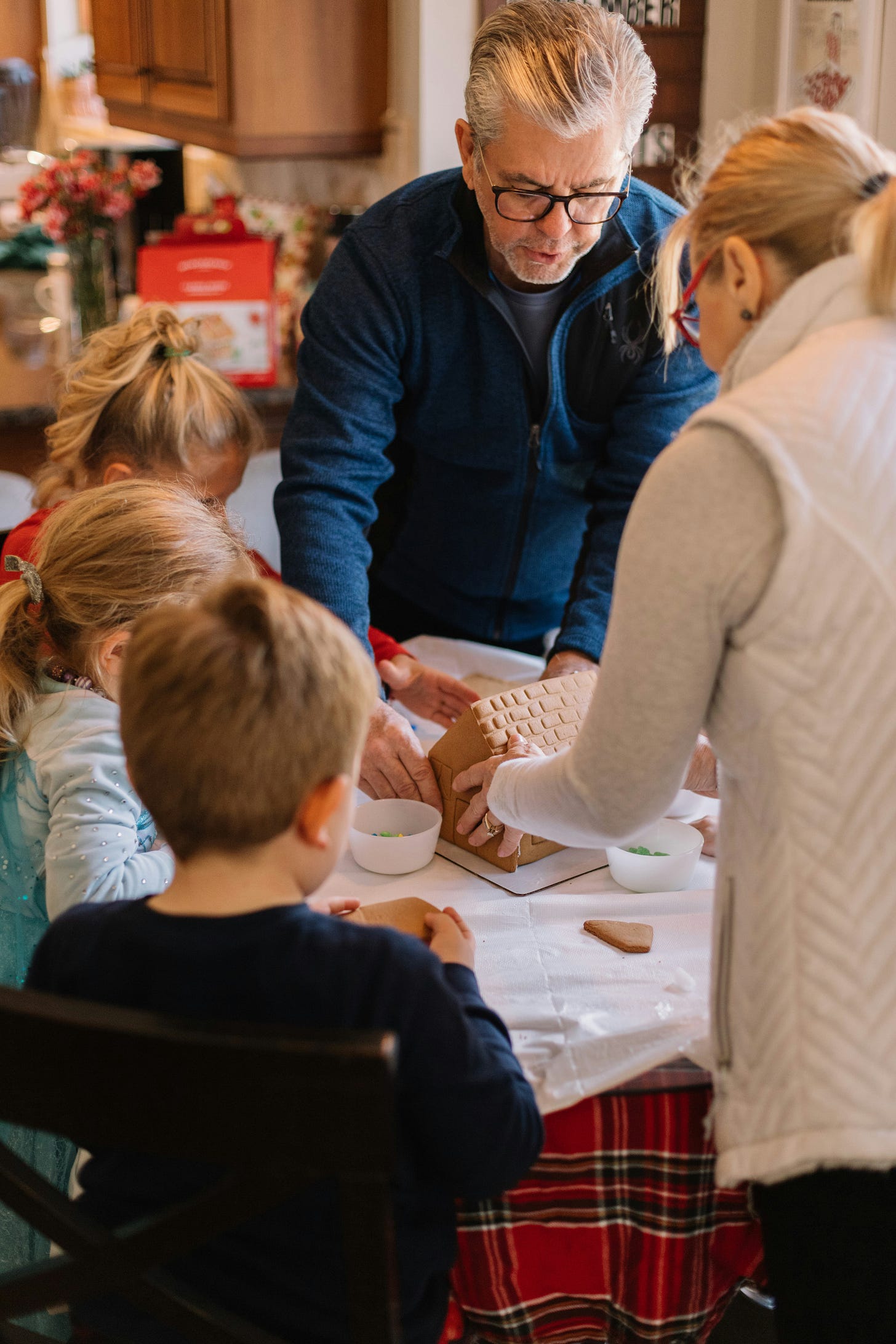Growing up in an extended family offered a unique and enriching experience, especially when divorce was rare. My parents' divorce in the 1930s was highly unusual, and it shaped the trajectory of my childhood. After the divorce, my mother was granted full custody of my brother and me, and we moved to live with our grandparents in the Bronx, New York City. This situation gave us a reassuring sense of security thanks to its stable and encouraging environment and the network of relatives integral to our upbringing.
The Richness of Extended Family Life
Living with my grandparents and having uncles, cousins, and my grandfather's siblings nearby created a vibrant and dynamic family life. The presence of many relatives provided a sense of security and belonging that might have been absent in a nuclear or single-parent family. Each family member contributed to a tapestry of experiences and relationships that enriched my childhood.
The close-knit family structure offered numerous benefits. For one, there was always someone available to provide care and attention. Whether it was my grandparents watching over us. At the same time, my mother worked, and my uncles took us on outings; we were always well-spent in supervision and affection. This constant presence of family members ensured that we felt loved and supported, which was particularly important given the societal stigma surrounding divorce at that time.
During the holidays, my grandparents and extended family met at our house. My grandfather, the oldest male in the family, was traditionally considered the head of the extended family. This is why everyone gathered at his house, where my brother and I grew up. One of my most beautiful memories of those times is everyone sitting around the holiday table. Inevitably, the conversation would shift to the older generation reminiscing about their lives growing up together as kids.
It was fun listening to their endless stories. These stories often revolved around how they got into trouble and caused mischief. Yet, the stories and reminiscences were not just about mischief; they also included warm and beautiful events they experienced at the beginning of the 20th century or the end of the 19th century, making the stories all the more colorful.
The Benefits of Extended Family Support
Reflecting on my upbringing, the benefits of having an extended family are clear. For children, the presence of multiple relatives fosters a sense of stability and continuity. Grandparents, uncles, and aunts can provide consistent care, emotional support, and guidance. They serve as additional role models, each contributing uniquely to a child's development. The variety of relationships within an extended family helps children learn social skills and develop a broader perspective on life.
For parents, the support of an extended family is a priceless asset. In my mother's case, it was a lifeline. She could work and provide for us, knowing that we were safe and well-cared for by our grandparents and other relatives. This support alleviated some of the pressures of single parenthood. It allowed her to focus on her responsibilities without constant worry. Additionally, the emotional support from relatives was a guiding light for her, helping her navigate the challenges of raising children after a divorce.
Preserving Family History and Traditions
Another significant aspect of growing up in an extended family is preserving family history and traditions. My grandparents and their siblings played a vital role as the keepers of our family's stories and cultural heritage. They shared tales of our ancestors, celebrated traditional holidays, and taught us customs that might have been lost in a smaller family unit. The grandparents' encouragement of this connection to our past gave me a sense of identity and belonging that has persisted throughout my life.
In the past, extended families were the norm in America. Grandparents, aunts, uncles, and cousins often lived near each other, creating a network of support and connection. However, the decline of extended families and the role of grandparents in child development is not just a change in family structure but also a potential loss of valuable resources for children's well-being. Numerous factors have contributed to this shift, which has resulted in the decline of extended families and altered the social structure of communities.
One primary reason for the decline of extended families is increased mobility. Today, people move more frequently for education and job opportunities. This mobility often results in families living far from their relatives. Many individuals relocate to areas with more plentiful jobs, leaving their extended families behind. This separation weakens familial bonds and reduces the frequency of face-to-face interactions.
Another contributing factor is the rise of individualism in American culture. Society places a high value on personal independence and self-sufficiency. This cultural shift has led to a focus on the nuclear family, with less emphasis on maintaining close ties with relatives.
This type of family contributes to community cohesion. When multiple generations of a family live in the same area, they are more likely to participate in community activities and maintain social networks. This involvement can enhance community stability and create a supportive environment for all residents.
Child Development
Children have always benefited from the presence of multiple adult role models. Each family member brings unique skills, values, and knowledge, contributing to a well-rounded upbringing. With their wealth of experience, grandparents often share stories and traditions, instilling a sense of history and continuity. Aunts and uncles may introduce children to new hobbies and interests, broadening their horizons beyond what their parents offer.
Parents are provided with consistent care and supervision. This is particularly valuable in families where both parents work outside the home. Grandparents or other relatives can look after the children, ensuring they are well cared for in a familiar, loving environment. This arrangement offers children stability and continuity, essential for healthy emotional development.
These families also promote social skills and a sense of community. Children learn to interact with diverse people in their family environment as they grow up. They learn essential social skills like communication, empathy, and conflict resolution in a supportive environment. These skills are invaluable as they navigate relationships outside the family, in school, and later in life.
The extended family also provides emotional support to parents. Parenting can sometimes be isolating and overwhelming, but having relatives to talk to can alleviate some of this stress. Grandparents and older relatives, in particular, can offer advice and guidance based on their parenting experiences. This wisdom can be invaluable, helping parents navigate the challenges of raising children.
In addition to practical support, extended families foster a sense of belonging and community for all the relatives. Celebrating holidays, birthdays, and other special occasions with a large family creates lasting memories and traditions. These gatherings provide opportunities for bonding and reinforce the family's cultural and emotional ties.
The Role of Grandparents:
Grandparents hold a unique and vital position within the extended family. Their presence and contributions significantly enhance the lives of children, provide essential support to parents, and preserve family history and heritage. Their involvement creates a multi-generational family dynamic that offers stability, continuity, and a deep sense of belonging.
Grandparents and children:
Grandparents often share a special bond with their grandchildren. This relationship provides children with additional love, affection, and security. Grandparents tend to be more patient and indulgent, offering unconditional love that comforts children. This connection helps build a child's self-esteem and emotional well-being.
Both grandmother and grandfather help maintain family routines and traditions, ensuring continuity and stability within the household. Their involvement in daily activities and special occasions fosters a cohesive family unit where everyone feels connected and supported.
One of the most significant roles grandparents play is as the keepers of the family's history and heritage. They are the storytellers who pass down family legends, traditions, and cultural practices, instilling a sense of pride and responsibility in children for their family's past and future.
These narratives often include lessons about the family's struggles, triumphs, and values, providing children with pride and belonging. Knowing where they come from helps children develop a stronger sense of self and continuity. Grandparents' stories also teach children about the broader historical and cultural contexts in which their family lived, fostering a greater appreciation for their heritage.
They teach traditional skills and crafts, preserving cultural practices that might otherwise be lost. Whether cooking traditional recipes, practicing ancestral crafts, or celebrating cultural holidays, these activities help keep the family's cultural heritage alive and vibrant.
In conclusion, grandparents play a multifaceted and irreplaceable role within extended families. Their relationship with grandchildren provides emotional support, mentorship, and security. For parents, they offer practical assistance, guidance, and emotional support. As keepers of family history and heritage, grandparents ensure the family's legacy is passed down through generations. Their presence and contributions create a rich, supportive, and connected family environment, highlighting the enduring value of extended families in fostering strong, resilient communities.







Loved this piece!!